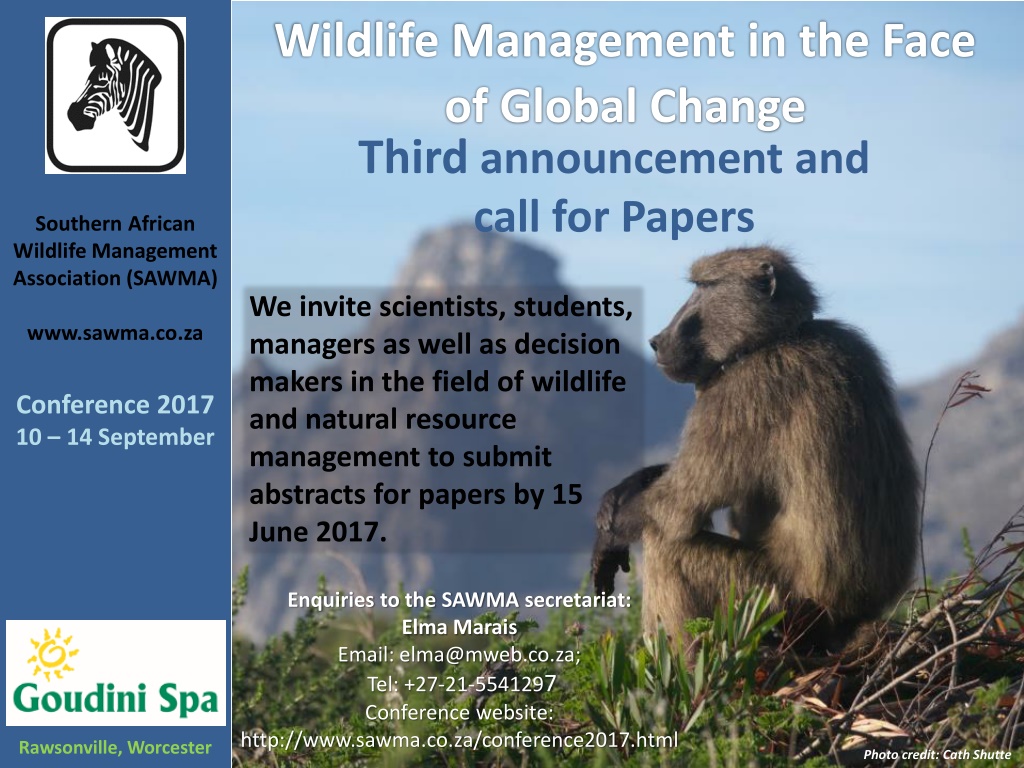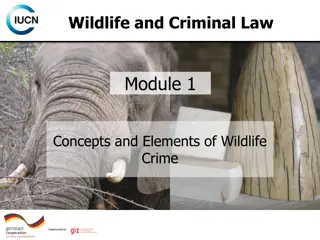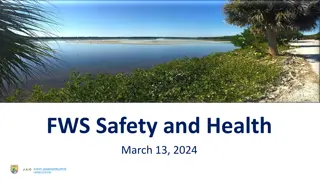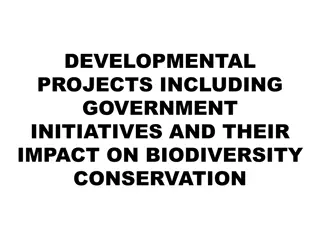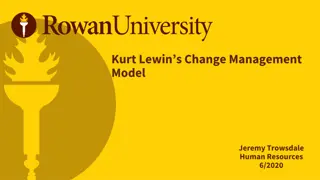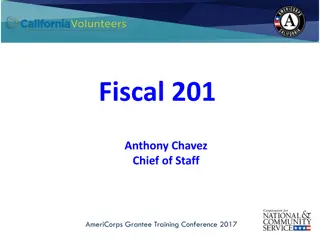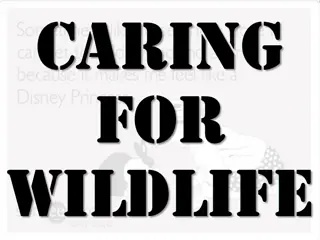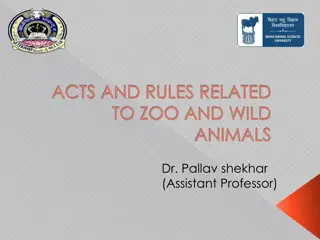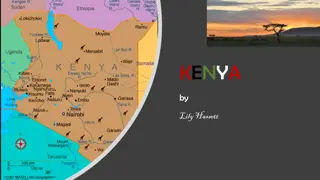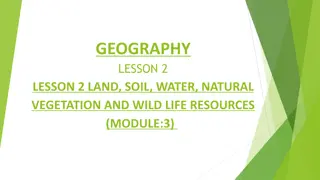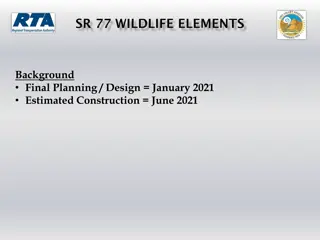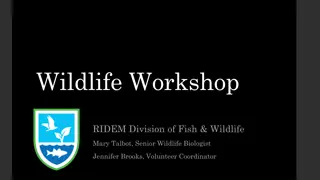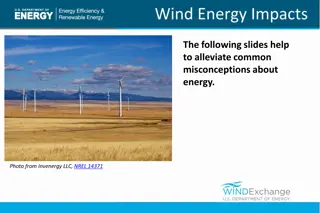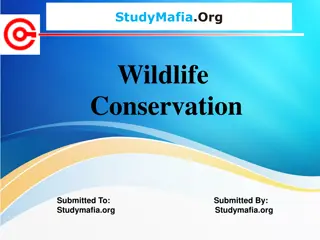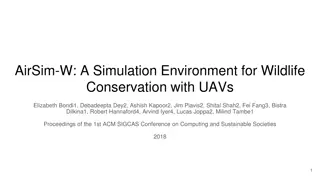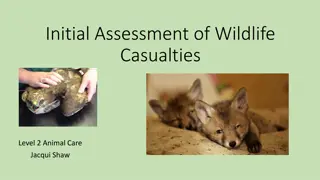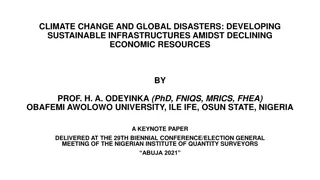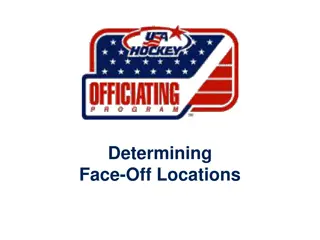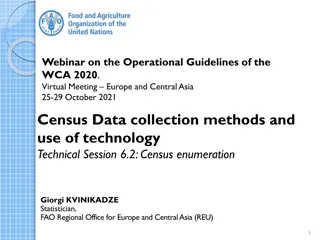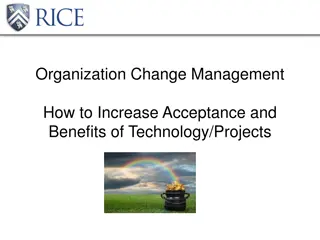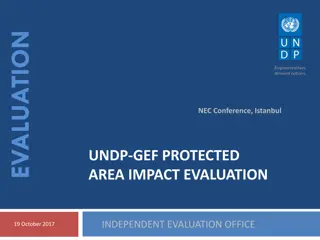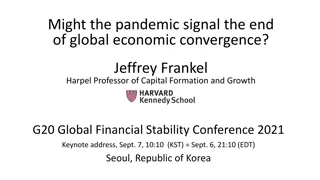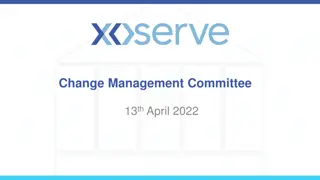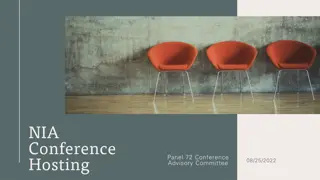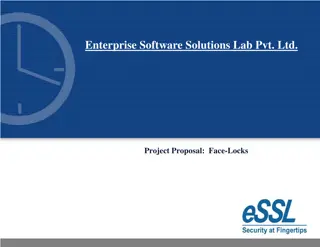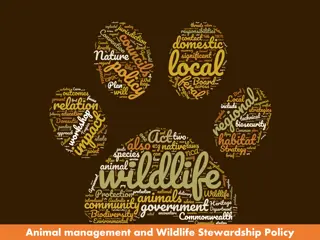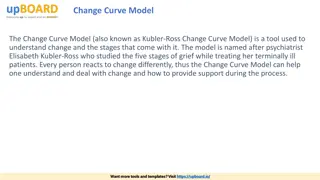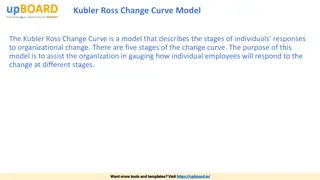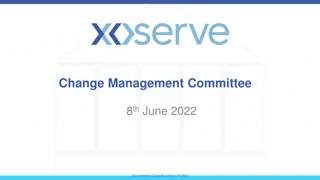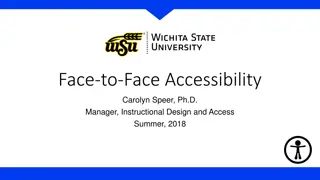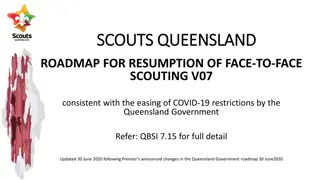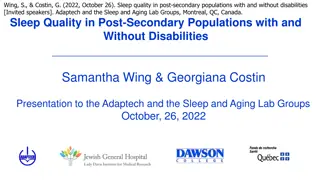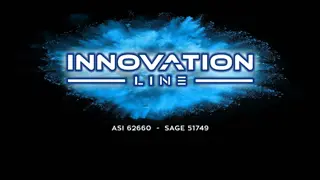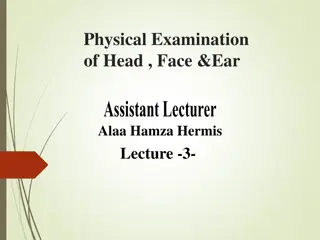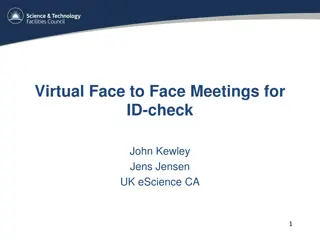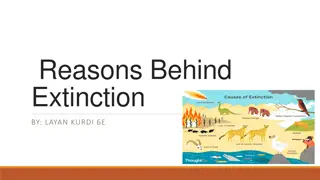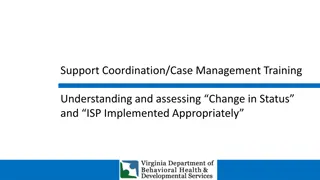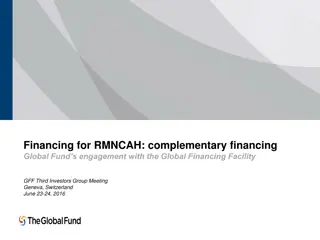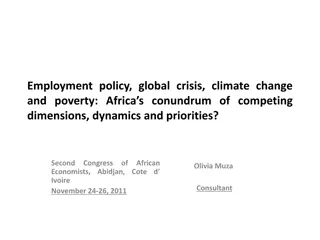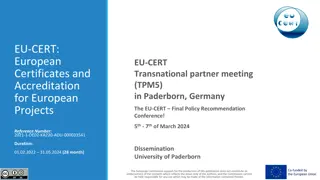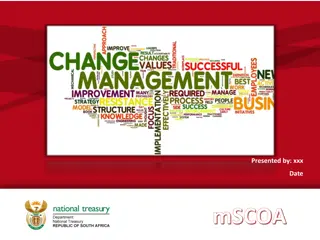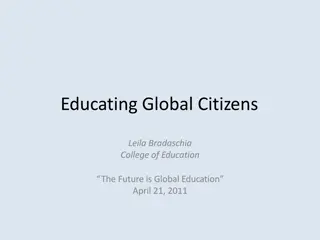Wildlife Management in the Face of Global Change Conference 2017
Explore challenges in wildlife management amidst global change at the Southern African Wildlife Management Association's conference. Key themes include climate change, wildlife trade, human-wildlife conflict, and invasive species. Submit abstracts by 15th June for a chance to present and engage with top researchers and experts. Guest speaker Prof. Steve Redpath will deliver a keynote on conservation conflicts. Don't miss this opportunity to contribute to the dialogue on enhancing wildlife persistence in a changing world.
Download Presentation

Please find below an Image/Link to download the presentation.
The content on the website is provided AS IS for your information and personal use only. It may not be sold, licensed, or shared on other websites without obtaining consent from the author. Download presentation by click this link. If you encounter any issues during the download, it is possible that the publisher has removed the file from their server.
E N D
Presentation Transcript
Wildlife Management in the Face of Global Change Third announcement and call for Papers Southern African Wildlife Management Association (SAWMA) We invite scientists, students, managers as well as decision makers in the field of wildlife and natural resource management to submit abstracts for papers by 15 June 2017. www.sawma.co.za Conference 2017 10 14 September Enquiries to the SAWMA secretariat: Elma Marais Email: elma@mweb.co.za; Tel: +27-21-5541297 Conference website: http://www.sawma.co.za/conference2017.html Rawsonville, Worcester Photo credit: Cath Shutte
Wildlife Management in the Face of Global Change Rationale Today, wildlife conservation efforts in Africa face more challenges than ever before. Scientific Programme committee Africa is expected to account for more than half of the world s population growth 2015 and 2050. Wildlife trade, both legal and illegal, is of increasing global conservation concern. Climate change moved from an idea to a tangible reality and alien invasive species are spreading locally, despite our best efforts. between Frans Radloff (Scientific Committee Co-ordinator, Cape Peninsula University of Technology), Louw Hoffman (University of Stellenbosch) and Craig Tambling (University of Fort Hare). How serious are these concerns and how do we best act and prepare for these challenges?
Wildlife Management in the Face of Global Change Proposed Sub-themes Climate change and associated challenges Projections, reactions and reality Presentations This year we would like to provide an opportunity for full presentations of 15 minutes (12 minutes plus 3 minutes for questions) but in stead of posters we introduce speed presentations of 7 minutes (5 minutes plus 2 minutes for questions). Wildlife trade (legal and illegal) and its consequences on species integrity, population stability and ecosystem functioning Human-wildlife conflict in an increasingly fragmented and populated landscape. Please submit titles and abstracts by 15 June 2017. Abstracts should not exceed 250 words and will be reviewed by the scientific committee before final acceptance. See guidelines for the format of abstracts at http://www.sawma.co.za /conference2017.html Invasive species (fauna and flora) and wildlife management Scope, effects and mitigation Understanding species, populations, communities and ecosystems in the context of global change Enhancing scientific knowledge to ensure wildlife persistence
Wildlife Management in the Face of Global Change Guest Speakers Prof Steve Redpath University of Aberdeen, UK His keynote presentation titled, Searching for solutions to conservation conflicts an international perspective, will address aspects of human-wildlife conflict. Background: Prof Redpath started his career as an applied population ecologist who worked extensively on bird populations, especially in the UK uplands. He got his PhD from Leeds University, and then worked for the Institute of Terrestrial Ecology / Centre for Ecology & Hydrology for 17 years before moving to the University of Aberdeen in 2007, where he has a chair in Conservation Science. Over the years, he has managed large scale experiments to explore the role of competition, predation and livestock grazing on bird populations. Over the last 10 years his research has moved to focus on conservation and in particular on the conflicts between conservation and other interests. In 2007, he became Director of the Aberdeen Centre for Environmental Sustainability and he now works on a variety of systems across the world from Snow Leopards in the Himalayas to Sea Eagles and geese in the west of Scotland. Through his work he seeks to understand conflicts and develop strategies for their effective management. He is increasingly interested in how to develop transdisciplinary approaches to tackle issues in environmental sustainability. He has published 161 peer reviewed papers and has edited 3 books. He has given presentations on his work at universities and conferences across the world. He holds honorary positions at the Nature Conservation Foundation in India and at Cape Town University. He sits on various panels for research councils in the UK and Sweden and he currently holds the King Carl XVI Gustaf guest professorship in Environmental Science in Sweden.
Wildlife Management in the Face of Global Change Guest Speakers Prof Barend Erasmus Global Change Institute , University of the Witwatersrand His keynote presentation will address aspects of climate change and associated challenges. Background: Professor Barend Erasmus is one of South Africa s leading experts in the field of climate change impacts, spatial ecology and land cover change. His doctoral degree was the first assessment of climate change impacts on biodiversity in South Africa, and the core paper from the study continues to be cited in international literature. Barend has more than 80 primary publication outputs, with over 3 500 citations. He is the Exxaro Chair in Global Change and Sustainability, and Director of the Global Change Institute (GCI). As the Director of GCI, he is tasked with not only aligning the Institute to reach its core objectives, but to also engage with various key role-players such as government, industry, researchers and business to collaboratively work together to tackle global change challenges. He has forged collaborative partnerships with recognised centres of expertise including the Council for Industrial and Scientific Research (CSIR), SANParks, the Rochester Institute of Technology (USA) and the University of Bonn (Germany). As the Exxaro Chair in Global Change and Sustainability, Barend s own research focuses on long-term patterns of landscape change, and how to ensure that ongoing- and future changes take us closer to sustainability. Passionate about research and imparting knowledge, Barend has supervised over 50 Honours, MSc and PhD students.
Wildlife Management in the Face of Global Change Guest Speakers Dr Vivienne Williams University of the Witwatersrand Her keynote presentation will address aspects of traditional medicine and wildlife trade. Background: Dr Vivienne Williams is an ethnobiologist in the School of Animal, Plant & Environmental Sciences at the University of the Witwatersrand, and an NRF C1-rated researcher. The key theme of her research for 25 years has been wildlife trade (particularly the trade in plants and animals for zootherapeutic or muthi purposes) and, since 2013, the domestic and international trade in lion body parts and bones. She has undertaken research in traditional medicine markets and shops across South and Southern Africa, and assisted with research in China. Along with her students, she has investigated the trade in various taxa for traditional medicine across the continent such as cycads, birds and reptiles. In 2013, she began a collaboration with the Wildlife Conservation Research Unit (WildCRU, Oxford University) and TRAFFIC on the trade in lion derivatives, which led to her being the leading researcher and author on several associated publications, for example the 2015 report Bones of contention: an assessment of the South African trade in African Lion Panthera leo bones and other body parts . She is currently collaborating with SANBI to analyse and monitor the lion bone trade and the lion captive breeding industry in South Africa in order to increase the scientific evidence base for decision making in the wake of decisions taken at the 17th Conference of the Parties to CITES. For more info on her publications, see https://sites.google.com/view/wildscience/home
Wildlife Management in the Face of Global Change Guest Speakers Dr Pip Masters Envisage Environmental Services Her keynote presentation will discuss the variety of approaches used to manage a range of invasive species in Australia. Background: Dr Pip Masters began her research career with CSIRO based in Alice Springs, central Australia. Her research focused initially on determining the effect of fire on small mammal and lizard populations but then moved to the management of a small, threatened carnivorous marsupial Dasycercus blythii where she explored the manipulation of ground cover using fire and harvesting to improve habitat suitability. In the past 20 years her work has moved to the control and eradication of invasive species on Kangaroo Island, located 14 km from the mainland in South Australia. She has faced the challenges of managing iconic and politically sensitive species such as koalas which were introduced and have become over-abundant on the Island and in southern Australia, but threatened in other parts of their range. She has also been instrumental in the development of programs for the control or eradication of a range of exotic introduced species including fallow deer, feral goats, pigs, cats and peacocks. This has required galvanising support of the local community and the participation of local, state (provincial) and national agencies. No goats and no breeding deer are known to remain, making Kangaroo Island (4500 km2) one of the largest islands in the world where these species have been effectively eradicated.
Wildlife Management in the Face of Global Change Guest Speakers Dr John Hanks former Chief Executive of WWF - South Africa and previous Executive Director of the Peace Parks Foundation He will give his perspective and future vision for conservation in Africa in the face of unprecedented global change Background: John Hanks is a zoologist by training with his first degree in Natural Sciences from Magdalene College, Cambridge, followed by a PhD on the reproductive physiology, growth, and population dynamics of the African elephant in the Luangwa Valley, Zambia. He has over 45 years of experience in a wide variety of conservation management, environmental education and research projects. He has worked in several African countries, including Angola, Botswana, Ethiopia, Kenya, Mozambique, South Africa, Zambia, and Zimbabwe. His major most important postings have been: Chief Professional Officer for the Natal Parks Board; Professor and Head of the Department of Biological Sciences, then the first Director of the Institute of Natural Resources at the University of Natal; the Director of the Africa Program for WWF International (based in Gland, Switzerland); the Chief Executive of WWF-South Africa; the first Executive Director of the Peace Parks Foundation. He has published over 150 scientific papers and three books.
Wildlife Management in the Face of Global Change Guest Speakers Prof Ken Findlay Cape Peninsula University of Technology (CPUT) in Cape Town Prof Findlay will address delegates during the formal dinner on Southern African Whale Research - why whale researchers do what they do. Background: Prof Ken Findlay is the Research Chair: Oceans Economy at the Cape Peninsula University of Technology (CPUT) in Cape Town, South Africa and previously directed the MRI Whale Unit of the University of Pretoria. At CPUT Ken directs the Centre for Sustainable Oceans, focusing on oceans economies and governance and ecosystem based management approaches to balancing ocean health and human benefits from the ocean space. Rapidly expanding national and regional oceans economies around the world are placing increasing stresses on ocean systems that provide humans with benefits including provisioning, regulatory and cultural ecosystem services. As a marine mammal biologist, Ken has been integrally involved in marine mammal research in the Southern African region, in the Arabian Sea region, the Western Indian Ocean and in the Southern Ocean for the last 30 years. He is a member of the Scientific Committee of the International Whaling Commission (IWC) and is a member of both the IUCN Cetacean Specialist Group and Sirenian Specialist Group. He was integrally involved in the IWC s IDCR and SOWER Antarctic survey programmes between 1991 and 2005 and in the IWC s Comprehensive Assessment of Humpback Whales since 2000. He has a strong interest in ocean acoustics.
Wildlife Management in the Face of Global Change Registration and accommodation For registration and accommodation booking visit the conference website: http://www.sawma.co.za/conference2017.html Registration and booking forms are also available from the conference secretariat: Elma Marais (elma@mweb.co.za) Venue The Goudini Spa is located in the Boland mountains approximately 45-60 minutes drive from the Cape Town International Airport along the National Road (N1) to Johannesburg close to Worcester and Rawsonville. Full registration includes a registration pack, administration fees and all meals from 10-13 September. To qualify for lower registration rates, registration fees must be received before 15 July. Meals: Please note that instead of breakfasts and lunches on 11,12 and 13 September, brunch will be served mid- morning. However the accommodation has fully self catering facilities. There is also a restaurant , convenience store and fast- food restaurant on the premises. On the day of departure, 14 September, an optional breakfast is available to delegates. There are various accommodation options available. More information on the various types of accommodation offered are detailed on the Goudini Spa Website, although not all options are available to delegates. http://www.atkvresorts.co.za/goudinispa- accommodation Please indicate on the accommodation booking form who you will be sharing accommodation with if this has been arranged with other delegates before hand.
Programme Programme outline Sunday, 10 September Arrival, registration, welcoming function Monday, 11 September Presentations, Student outing, Braai and student quiz. Tuesday, 12 September Presentations, AGM, Wine tasting and Mongolian Stir-fry evening. Wednesday, 13 September Presentations, Gala Dinner and Awards ceremony. Thursday, 14 September post conference tour The scientific programme will be available in July, once all abstracts have been reviewed. Travel Participants are required to make their own travel arrangements to Goudini or to Cape Town International Airport (CTIA). Vehicle rental facilities are also available at CTIA. Post Conference Tour A post conference visit to the Rooiberg-Breede River Conservancy is planned for Thursday morning 14 September and will include a picnic lunch and a tasting of the M thode Cap Classique Wines at Graham Beck s Robertson estate, Madeba. The field trip should finish by the latest at 14h00. More information will be available at a later stage. For directions visit: http://www.atkvresor ts.co.za/goudinispa- map
